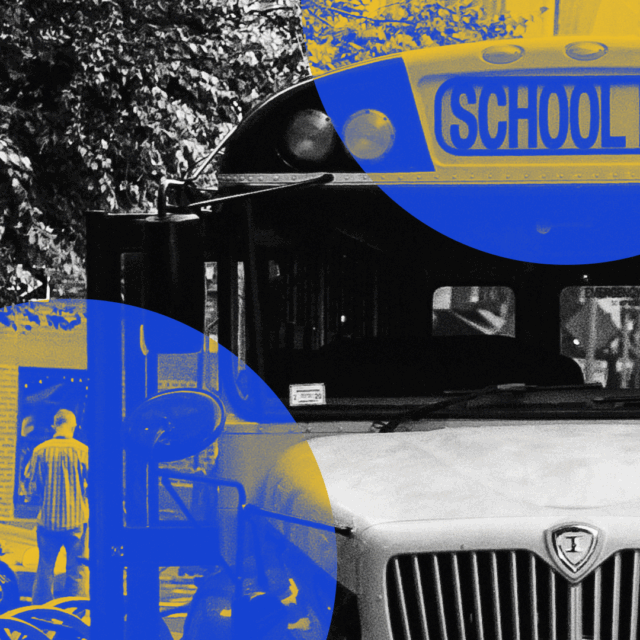Talking to Children About Mass Violence in Schools
A Resource for Teachers and School Staff
Learn More:
Introduction
We know children are affected by gun violence in our country even if they have not experienced a shooting on school grounds. For teachers and school staff working with children, there may be uncertainty about how to have a conversation with a child about an incident of gun violence in a way that does not cause further trauma. Here are some helpful tips to approach the conversation with a child.
Primary Steps
Step 1: Identify any outstanding safety concerns.
This goes for both inside and outside the classroom. Ensure there are no active threats at school or at home. Try to be aware of previous traumas that may intensify feelings for some students. Ensure they all know you are a source of safety and a resource for information.
Additional Resource
Step 2: Prepare to respond and actively listen to students in distress.
- Understand the common ways in which children might react to news of violence. Confusion, fear, and anger are all typical responses, among a myriad of others.
- Consider the child’s level of processing abilities, and begin to talk to them in a warm, honest way. You want to promote trust, so don’t give the impression that you are downplaying the severity of the situation or withholding information. Give the basic facts without oversharing details.
Additional Resource
Step 3: Accommodate for upcoming changes. The effects of trauma can be transformative.
- At school, be ready to modify lesson plans, curriculum goals, classroom expectations, and organizational structure according to need. All security policies and safety plans should be updated.
- Be mindful of behavioral changes in students. Notice any alarming patterns. Lead with kindness and tolerance, and create room for discussion with the student and/or a guardian.
Additional Resources
Step 4: Providing care and implementing resources. The road to recovery can be long and difficult.
- Conduct survey and scholarly research to establish the demand of professional, third-party services.
- Allow those who are old enough to collaborate in identifying new physical and emotional needs.
- Advocate for students’ long term needs, mental health care, and institutional programs/resources to ensure consistent support. Encourage students to voice concerns, needs, and feelings.
Additional Resources
The Importance of Self-Care
In order to be an effective leader during a crisis, caring for yourself is an essential step. Taking care of others is not possible if you are not tending to yourself. Once you incorporate self-care into your routine, it is easier to encourage others to follow your lead. Promoting healthy stress management and coping skills at home and at school can help students find necessary, accessible emotional outlets. Whether this is asking for help, or practicing hobbies like athletics and arts, it is important for children to find healthy emotional outlets they can utilize through life. Make sure you are carving out designated time that can be used for anything calming and healing.
Additional Resource
References
Flannery, M. E. (n.d.). Inside a trauma-informed classroom. NEA. Retrieved September 13, 2022, from https://www.nea.org/advocating-for-change/new-from-nea/inside-trauma-informed-classroom
The National Child Traumatic Stress Network. (n.d.). Helping youth after community trauma for educators final explosions. Retrieved September 13, 2022, from https://www.nctsn.org/sites/default/files/resources/tip-sheet/helping_youth_after_community_trauma_for_educators_final_explosions.pdf
The National Child Traumatic Stress Network. (n.d.). Providing psychological first aid: Teachers – the national child … Psychological First Aid: Teachers. Retrieved September 13, 2022, from https://www.nctsn.org/sites/default/files/resources/fact-sheet/pfa_for_schools_for_teachers.pdf
The National Child Traumatic Stress Network. (n.d.). Age-related reactions to a traumatic event – the national child … Retrieved September 13, 2022, from https://www.nctsn.org/sites/default/files/resources/age_related_reactions_to_traumatic_events.pdf
The National Child Traumatic Stress Network. (n.d.). Psychological first aid for schools – the national child traumatic … Psychological First Aid for Schools. Retrieved September 13, 2022, from https://www.nctsn.org/sites/default/files/resources/pfa_schools.pdf
National Education Association . (n.d.). Trauma-informed schools. NEA. Retrieved September 13, 2022, from https://www.nea.org/professional-excellence/student-engagement/trauma-informed-schools
National Education Association. (n.d.). NEA’s School Crisis – National Education Association. Retrieved September 13, 2022, from https://www.nea.org/sites/default/files/2020-07/NEA%20School%20Crisis%20Guide%202018.pdf


